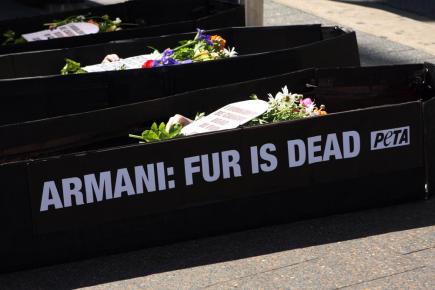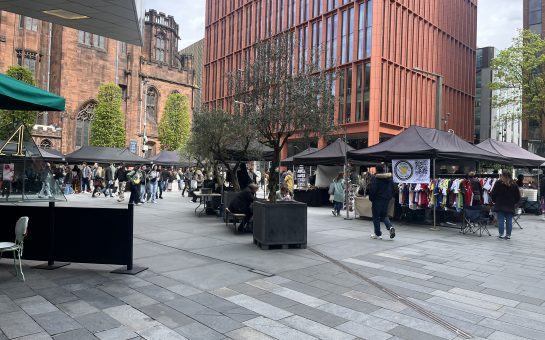Manchester fashionistas are restoking the fire under the heated fur debate as sales have shot up by 93% in the last 16 years, according to International Fur Trade figures.
A celebrity-backed campaign from animal welfare organisation PETA last year heralded the efforts of fashion brand Lacoste in no longer stocking products containing angora wool, while FCUK chose to ditch the fur after a Manchester social media campaign ‘got’ to them.
However, despite the pressure from organisations like PETA, fur has re-asserted its presence on the high streets of Britain and, if anything, it’s only getting more popular.
The resurgence is due, in part, to increased efforts by the fur industry to counter animal welfare campaigns with information of its own.
Mike Moser, CEO of the British Fur Trade Association (BFTA), told MM: “The view of this younger generation on fur seems to be the same as for many other topical issues: ‘If you give us the facts, then we will make up our own minds.’
“We believe that increasingly people are recognising that under conditions of good animal welfare there really is no moral distinction between eating meat or fish or cheese, wearing silk or leather… or indeed, wearing fur.”
Adelle Doughty, founder of Manchester-based fashion retailer Style Skin confirms the trend, noting a marked increase in sales of fur products in the past five years.

FAUX FUR TO MOCK CROC: Animal rights campaigners PETA are known for their vocal publicity stunts against the fur trade
(©Eva Rinaldi, with thanks)
She said: “I certainly notice it most days throughout Manchester – especially with the arrival of the infamous Christmas markets – with lots of people wrapping up warm in fur headbands and over sized fur scarves.”
Miss Doughty’s experience highlights the success of such measures, drawing a clear line between industry efforts, consumer attitudes and rising sales:
“I think with the support of the BFTA and informative figures and information about the industry that it is much more accepted. This is certainly reflected in the rise in sales of fur over the past five years and also from the amount of faux fur products on the high street.”
Manchester Fashion Network have set up an online debating forum to try and gauge what the industry feels about the matter.
Director Dale Hicks said: “There are some clothing professionals we have spoken to who see no problem with selling fur, if it is not of an endangered species. Others prefer not to see animals being used for their skins but are okay with by-products such as leather.”
For PETA, however, there is no excuse for those choosing to wear animal skins. With campaigns ongoing against high street brands who continue to sell fur products, UK Director Mimi Bekhechi believes the real thing just isn’t needed.
“From faux fur to mock croc, it’s easier than ever to get a ‘killer look’ without killing animals,” she said.
“The few remaining retailers left that sell angora wool – for which rabbits have the fur ripped from their skin – need to lift the wool from their eyes and follow the compassionate lead of Lacoste and many more.
“We have sent a box of vegan chocolates to the company’s headquarters in Troyes, France, to thank Lacoste for its compassionate decision.”
The anti-fur view is shared by Matt Evans of Manchester Bridge Street menswear emporium Doherty, Evans & Stott, who opt not to stock fur products. MM asked him if he felt shoppers today were concerned about animal welfare.
He said: “I think so, definitely. Surely it’s common sense to not want to harm animals. We know the score nowadays and can’t claim to be ignorant of the other side of the fur trade.”
He notes a very different attitude in Italy, on his regular visits in search of new designs – suggesting that campaigns such as PETA’s have had some effect.
“You just don’t seem to get strong reactions like you do over here,” he said.
For many retailers, the debate is less about animal welfare than consumer choice. Fashion lovers on a budget may opt for faux fur while the real thing remains a luxury, explained Miss Doughty.
“Real fur pieces make up the majority of Style Skin’s best selling items. I feel that they are seen as investment pieces rather than style statements.
“We have [also] seen a rise in the more purse-friendly faux fur pieces like collars and fashion gilets over the past month or so, most likely purchased as gifts for the Christmas season.”
To take part in Manchester Fashion Network’s debate, click here.
Top image courtesy of LetIdeasCompete, with thanks.



